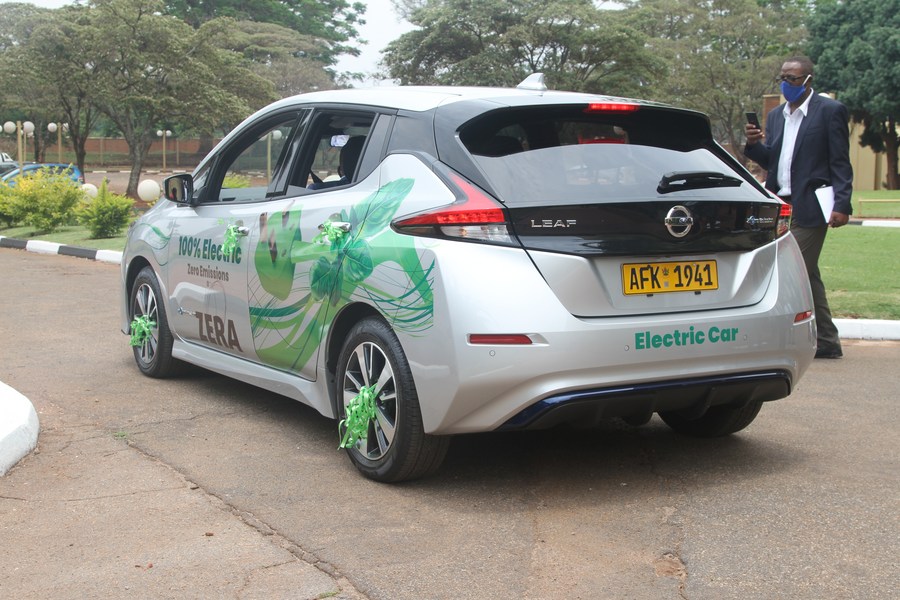
Zimbabwe launched Nissan Leaf, an electric vehicle manufactured by Japanese carmaker Nissan, in Harare, Zimbabwe, on Nov. 26, 2020. (Xinhua/Tafara Mugwara)
Zimbabwe has launched a Japanese-made electric car, Nissan Leaf, as the country prepares for a gradual shift to sustainable electric vehicles.
HARARE, Nov. 27 (Xinhua) -- Zimbabwe on Thursday launched an electric car as the country prepares for the gradual shift from internal combustive engine powered vehicles to sustainable electric vehicles (EVs).
Speaking at an event to officially mark the introduction of the electric car Nissan Leaf, Minister of Energy and Power Development Zhemu Soda said the move to adopt electric mobility technology is in sync with Zimbabwe's aspiration to be a modernized and mechanized country by 2030.
"E-Mobility is set to be a game-changer in the energy sector, transport system, climate outlook and also a catalyst of energy transition," he said.
"The introduction of electric vehicle is, therefore, a welcome development to the pool of other technologies and interventions that use clean energy," he said.
Soda said the introduction of EVs is set to open opportunities in the energy sector as well as in sectors such as the automotive sector, electronic and computer science, and engineering fields.
He said the government will also promote the charging of EVs from renewable energy such as solar to ensure further reduction of greenhouse gas emissions.
Speaking at the same event, Zimbabwe Energy Regulatory Authority (ZERA) CEO Edington Mazambani said the launch of the electric vehicle will excite the market leading to its increased uptake across the country while stimulating innovation and employment downstream.
"The coming in of this technology, therefore, marks the beginning of a journey towards efficient management of fuel consumption and clean environment as the market embraces electric vehicles," he said.
Mazambani said the adoption of EVs will significantly reduce the country's fuel import bill and improve transportation efficiency.
A series of awareness-raising, education, and sensitization programs have already been lined up in all cities and towns as a means to demystify the technology, Mazambani said.
Zimbabwe is currently developing an electric mobility framework in a bid to open space for increased adoption of electric vehicles.
The electric mobility framework has national targets and proposals which include duty-free imports to stimulate the growth of the sector and facilitation of investment in at least two EV assembly plants in the country.
Supporting infrastructure for the adoption of EVs, standards, and regulations are currently being developed.
The development of the E-Mobility Framework is financed by the Climate Technology Center and Network under the United Nations Environment Program. ■



